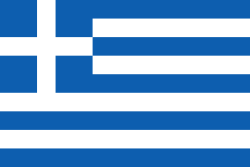| Greece at the 1988 Winter Olympics | |
|---|---|
 | |
| IOC code | GRE |
| NOC | Hellenic Olympic Committee |
| Website | www |
| in Calgary | |
| Competitors | 6 (5 men, 1 woman) in 2 sports |
| Flag bearer | Athanassios Tsakiris [1] |
| Medals |
|
| Winter Olympics appearances (overview) | |
Greece competed at the 1988 Winter Olympics in Calgary, Alberta, Canada.